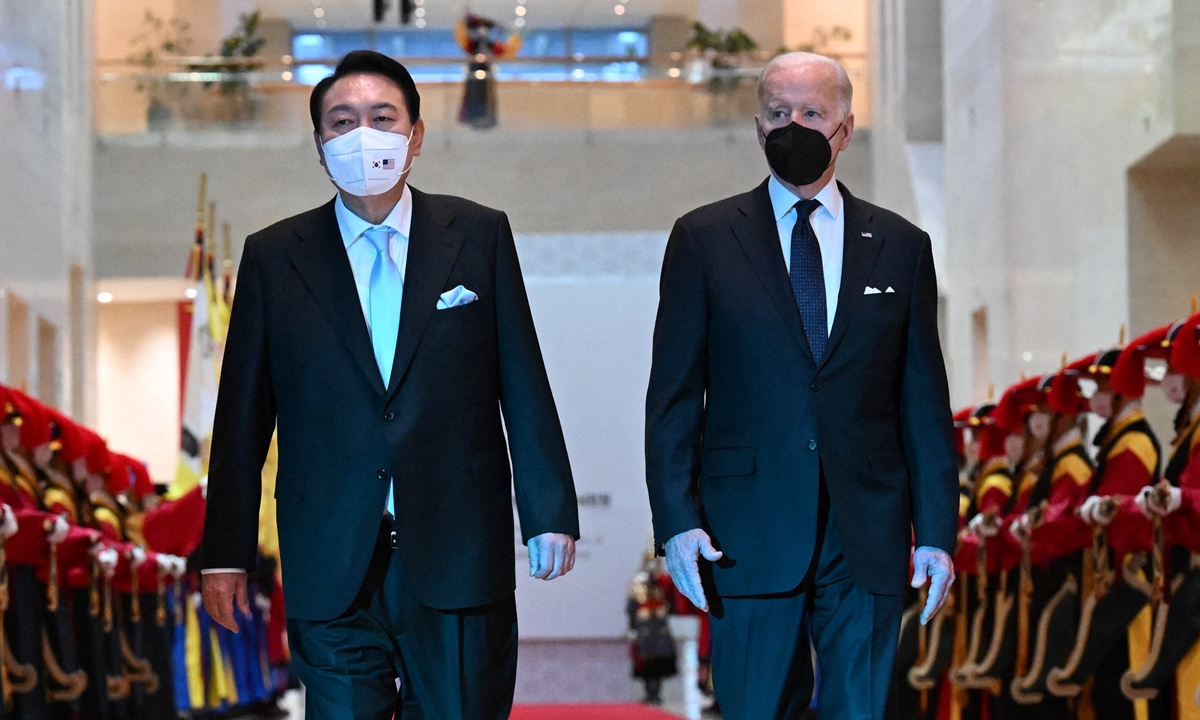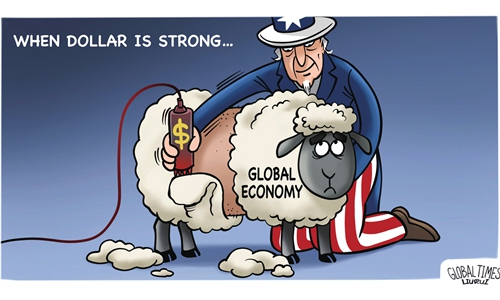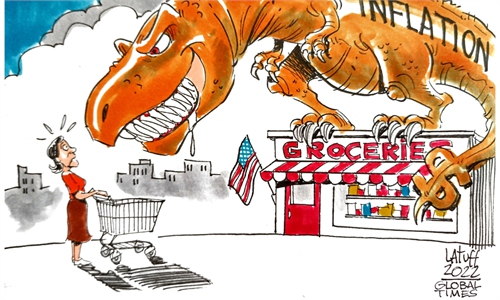Yoon, Biden to talk over Inflation Reduction Act but will US heed S.Korea’s concern?

South Korean President Yoon Suk-yeol (centre left) and US President Joe Biden arrive for a state dinner in Seoul on May 21, 2022.Photo: AFP
By excluding South Korean manufacturers from the US' Inflation Reduction Act (IRA), South Korea should realize that the US is never in full unison with them in interests, experts said as media reported that South Korean President Yoon Suk-yeol is scheduled to engage in a bilateral discussion with US President Joe Biden on Wednesday in New York to again address Seoul's concerns over the legislation.
Yoon is in New York attending the ongoing 77th session of the United Nations General Assembly. He is scheduled to have a bilateral meeting with Biden, according to South Korea's Yonhap News Agency.
The two leaders are expected to discuss the implementation of agreements reached during their summit in May in Seoul and will also address South Korea's concerns about the recently passed US IRA, Yonhap said.
The act, passed in the middle of August, excludes electric vehicles (EV) assembled outside North America from tax incentives, raising concerns it will act as a significant trade barrier for Korean-made cars.
Observers pointed out that it will put South Korean companies in an extremely disadvantageous position. Hyundai Motor currently ranks No.2 in the US' EV market, but if the biased subsidies are implemented, it will be impossible for South Korean cars to maintain their position, observers noted.
South Korean politicians, manufacturers and media outlets generally believe that the IRA is a "betrayal" of South Korea and "a stab in the back." South Korea has become so engulfed in disappointment and anger that the illusion of "free and fair trade" that underpins the US-led world order has been shattered again, observers pointed out.
During the meeting, the two leaders will continue to reiterate some macroscopic issues such as their strategic alliance relationship. South Korea is likely to try hard to have South Korean entities included in the list of subsidies under the IRA, but to achieve this goal, it has to bargain with the US at more pragmatic level, Dong Xiangrong, a senior fellow at the National Institute of International Strategy at the Chinese Academy of Social Sciences, told the Global Times on Wednesday.
Dong warned that excluding South Korea from the subsidy list sends a warning signal to South Korea that its interests are not in accordance with those of the US.
South Korea and the US have maintained long and close economic and industrial ties. Since the COVID-19 pandemic, cooperation between the two sides in trade and investment has been strengthened. They have clearly expressed their intention to develop the military alliance into a comprehensive strategic alliance, she said.
However, under the comprehensive strategic alliance, both sides have different goals, Dong noted.
The US is still adhering to the basic principles of "America First" and "US interests first" to establish its competitive advantage in emerging industries. The US will not hesitate to take action once a situation arises that may harm its own interests and benefit its competitors. As to South Korea, it is seeking some certainty under a turbulent international political and economic situation by binding with the US, Dong explained.
The South Korean government has sent a delegation to Washington to negotiate with the US over the act. South Korean authorities are also reportedly considering filing a complaint at the World Trade Organization (WTO) over the act, citing possibilities that the new law could violate WTO rules and a bilateral free trade deal.
But analysts consider that South Korea would end up disappointed despite all the efforts because, for the US, the alliance with South Korea exists in name only when it comes to the US' own interests.
The passage of the IRA, despite strong concerns from South Korea, indicates that the US did not take South Korea's interests into consideration from the very beginning, analysts noted.
In the long run, the US struggles to attract large-scale investment from South Korean automotive and semiconductor companies. South Korea's position in South Korea-US economic relations is on the rise, which was not the same as it was 10 years ago. But, even so, South Korea remains in a relatively disadvantaged position in US-South Korea relations, Dong noted.


